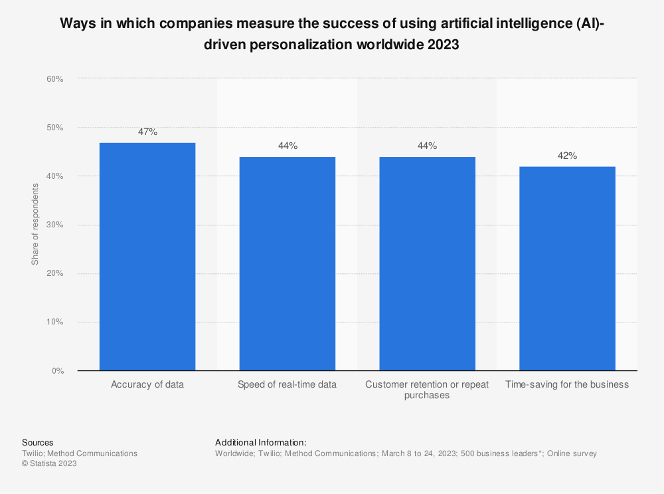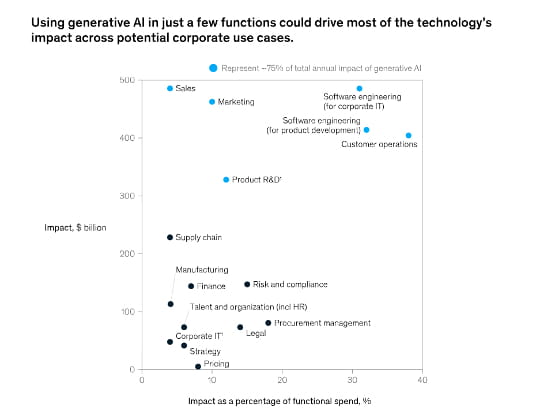
The application of generative AI in e-commerce has transformed the industry and enhanced every aspect of online enterprises. According to Forrester, generative AI will have an average annual growth rate of 36% by 2030, accounting for 55% of the AI software market. As the AI market is expanding, e-commerce companies should harness this innovative technology thanks to several benefits it offers.
1. Better search experience
Generative AI is crucial in improving search relevance for e-commerce customers. By considering user intent, context, and historical data, generative AI can generate personalized search results. Companies can also incorporate generative AI to enhance product image search. Operating on advanced algorithms to interpret visual content, generative AI allows users to search for similar or related items by providing images as input.
What’s more, genAI in e-commerce can help employees accelerate data collection thanks to cognitive search. Cognitive search is the next-generation search engine software that utilizes machine learning to ingest, understand, and organize information from multiple separate data.
Traditionally, employees have to manually locate, read, analyze, and summarize information across several pages, which can be time-consuming. According to Forrester, 54% of global information workers are interrupted from their work a few times or more per month to spend time looking for or trying to get access to information.
Cognitive search, powered by generative AI, allows e-commerce businesses to quickly gather diverse information sources (such as customer information on different social media platforms) and extract relevant data from unstructured formats. As Forrester pointed out in their 2023 report, the level of unstructured data managed by enterprises will double in 2024. Hence, cognitive search can be a game changer for data collection, not just for e-commerce but also in other industries.
2. Automated data analytics and reports
Generative AI can assist in creating advanced and interactive data visualizations. By understanding patterns and relationships within large datasets, AI algorithms can generate insightful charts, graphs, and dashboards. This helps businesses gain a deeper understanding of their data and communicate complex information in a more comprehensible manner.
Labeling and categorizing data are time-consuming processes, with data scientists dedicating 51% of their time to tasks like labeling, cleaning, and organizing information from reports. GenAI can automate the data-cleaning process and streamline the preparation of datasets for analysis. Businesses can save time and minimize human errors by automating data cleaning, such as identifying patterns, filling missing values, and standardizing formats.
What’s more, generative AI can analyze large volumes of data and provide concise text summaries through machine learning. This is particularly useful for executives and decision-makers who need quick overviews of key metrics and trends without delving into detailed reports.
3. Streamlined e-commerce operations
Overstocking, stockouts, and inventory shrinkage costs are major challenges for businesses worldwide. As a staggering 43% of small businesses still do not manage their inventory effectively, generative AI can help companies optimize inventory management. Businesses can gain real-time insights into stock levels and manage them effectively in different locations.
With generative AI, e-commerce organizations are able to predict demand based on historical data, market trends, and other relevant factors. AI-powered predictive demand analysis enables more accurate production planning and efficient allocation of resources.
Furthermore, anticipating demand helps companies meet customer expectations by ensuring product availability. This, in turn, can enhance customer satisfaction as customers can rely on the timely availability of the products they desire. Notably, 44% of ecommerce companies contributed customer retention as one of the main benefits of generative AI.

Image source: Statista.
4. Enhanced marketing strategies
Generative AI has taken hold rapidly in marketing and sales functions, in which text-based communications and personalization at scale are driving forces. Specifically, generative AI plays a pivotal role in creating marketing calendars. By analyzing historical data, market trends, and customer behavior, generative AI can identify patterns and correlations that help marketers optimize strategies.
Besides, this innovative technology can detect optimal times for promotions, product launches, and other marketing activities to ensure that promotional efforts align with peak customer engagement periods. Indeed, McKinsey’s research reveals that generative AI will account for 10% of global functional spending, approximately USD 463 billion.

Image source: McKinsey’s report.
Moreover, generative AI can effectively facilitate A/B testing. The AI-driven A/B testing process identifies the most effective variations, enabling marketers to make data-driven decisions and refine their strategies accordingly. With 73% of marketers already use AI in at least one part of their marketing efforts, generative AI can ensure that marketers can optimize based on real-time insights to enhance campaign performances.
5. Facilitate content creation
Generative AI can help businesses create engaging content tailored to their specific audience. Generative AI can speed up content creation by providing automated suggestions or even generating different content, including social media posts, blogs, and email newsletters. Indeed, research reveals that 90% of marketers consider AI effective for content creation. By inputting a few keywords, AI models can generate various concepts to help marketers overcome creative blocks.
In addition, generative AI is also crucial in search engine optimization (SEO). By generating SEO-friendly product descriptions or meta tags, organizations can significantly improve the visibility of products in search engine results. AI-generated content can also attract more organic traffic and improve the overall online presence. Specifically, 81.5% of SEO professionals report that generative AI has already affected their SEO strategy, with 37% predicting a significant impact.
Harnessing generative AI to stay ahead
The advent of generative AI marks a turning point in the e-commerce industry. Through its ability to facilitate personalized customer experience, elevate marketing initiatives, and optimize inventory management, generative AI presents e-commerce companies with endless opportunities.
Most importantly, as digital content is the initial touchpoint when customers look for products, businesses need to create and manage it efficiently. Thus, what strategies can e-commerce businesses devise to manage content when leveraging generative AI?
All will be answered in the latest Forrester’s report: Generative AI – What It Means for Content Management.






























